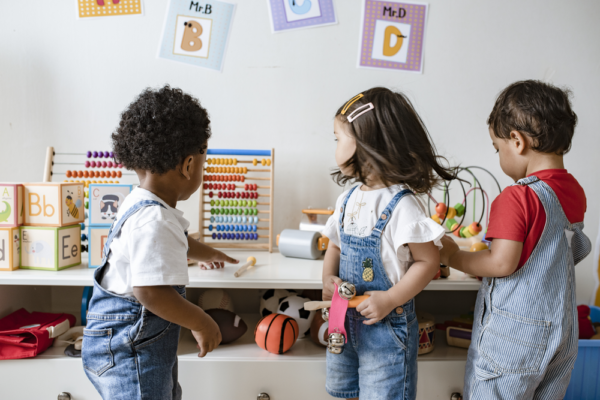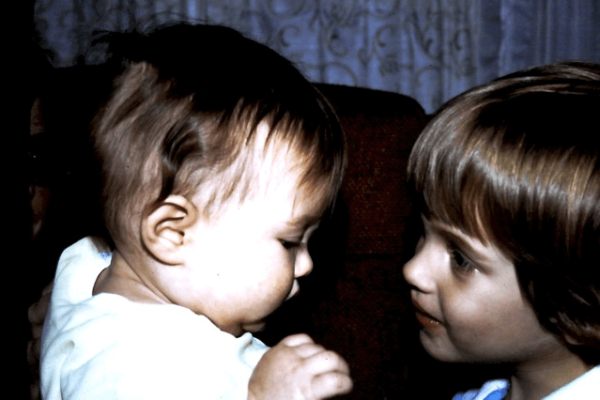Hitting. When will it end?
How to stop toddlers from hitting
TWENTY TIMES! I remember thinking, I’m pretty sure I’ve repeated myself twenty freaking times today. I was so annoyed and irritated but eventually became angry and absolutely exhausted.
“Gentle hands. We are always gentle with other people’s bodies. You can say, ‘excuse me’ and place your hand gently like this to get their attention.”
“Let’s practice. How can you get my attention gently?”
We were visiting my parents and I was traveling alone with my two-year-old. We brought my nephew with us, who is just starting that super fun pre-teen stage. My sister and brother, both still in high school, were there too. We are a very close family despite the age gap. My dad was remarried when I was younger and these two were born when I was in college. They’ve always been such an important part of my life. My sister and brother spend summers with us and we typically see them at least a couple of times a year even though they live across the country.
Needless to say, the teens were definitely not interested in playing with my two-year-old. Teenagers = massive amounts of screen time! They were literally glued to their phones at all hours. Meanwhile, these were my toddler’s idols. My little one was so excited to visit them and then it was like being at Disneyland and not able to interact with the characters. My toddler wanted so desperately to play and engage with them, that he found the best way to get their attention – HITTING! Yikes!
The first couple of days I kept my cool and felt like I had a solid script. I intervened by getting down to his level and showing him how I would touch gently. I redirected him to other activities and asked for help with various things around the house. I offered options of what he could do to get their attention. We practiced and talked about what it means to be gentle with others. I was able to stop the behavior at the moment every time.
However, as the days went on, the frequency of hitting actually increased. I kept repeating the lines, re-teaching and redirecting, and although it stopped the behavior at the moment, the hitting STILL CONTINUED.
Electronics are hard to compete with
Electronics are so powerful! Those teens looked like zombies on the couch staring at their phones and I couldn’t change that. They were going to be on their phones and I needed to teach my toddler how to ask for attention in a respectful way, but after days and days I was getting worn down and close to giving up.
So here’s what I did.
Mind you, I didn’t do this perfectly.
I stumbled through the process.
When I needed a break, I would leave the room knowing he was probably going to do it again, but I really couldn’t handle it without getting upset. I hoped that others would jump in when I didn’t. I know it’s important to be consistent and yet there were times when I was exhausted, defeated, and just done. I needed to regroup and come back stronger.
Ask for help
Clearly, I needed help. I asked for help from the teens and my parents. I gave the teens the script in the moment, “You can say – we always use gentle hands. I’m going to move to another room to keep my body safe.” In the evenings after my little one went to sleep, we talked about what was happening and why and what they could do or say when it happened. It ended up being a great opportunity for them to practice their own problem-solving skills and talk about their feelings (to a human!) in a safe space.
I asked my parents for help taking him on a walk outside or when I needed to leave the room for a bit to calm down. I knew if I wasn’t calm, he wouldn’t be either.
Get deeper
Thanks to Positive Discipline, I was able to look at the behavior as a way of communication:
Children seek connection and settle for attention.
He was saying. “Hello. I am here! See me. Notice me. Play with me. Involve me in your world. Come into my world.”
“For kids 0-3 the top 5 tools are distraction, redirection, supervision, supervision, SUPERVISION.”
~ Jane Nelsen, author of Positive Discipline
Eventually, it just became a learned behavior so he would literally just walk up and hit them and then walk away to do something else. I kept encouraging connection and doubled my own efforts with involving him usefully since I knew he wasn’t getting it from the teenagers.
It continued…
This too shall pass
Finally, after the trip, we had one last hitting hurrah. Our neighbors came over to play and we hadn’t seen them in months. My toddler was so excited to see the older girls that he (yep) hit them! I was so fatigued at this point and had just solo parented this for so long that I didn’t have the energy to intervene one more time so I just let the kids tell him themselves. Luckily for me, they are skilled with toddlers and had the words to assertively ask him to be gentle. I sat back and watched what would happen.
Eventually, he stopped. They all played together and it was fine. After that day, the hitting stopped. It’s now been months since he hit anyone. The crazy thing is, when you are in it, like so many of these phases, it feels like it will never end. (I really believed at one point that he had become a total psychopath and would never be allowed in kindergarten or have healthy relationships.) Then, one day you realize, “oh, that behavior stopped.” And you roll on. Like every other crazy developmental period, this too shall pass.
With hindsight, or maybe you are lucky to be on kid number 2 or 3 or 4, you start to get that experience and build up some perspective. Maybe you don’t take it so personally. Maybe you let go easier.
Letting go of control over the situation and the timeline is one of my most important parenting tools.
Here’s the deal. I may be a Positive Discipline educator AND these challenges still happen. It’s not about getting rid of the challenges but about seeing them as opportunities to teach. So yes, you are going to see my child have a tantrum, throw toys, hit other kids, refuse to eat, sleep, or use the potty. This is NORMAL. It’s also exhausting. So take your breaks out there. Ask for help when you need it. Have faith that this phase will pass, because it will.
So why didn’t I just ride it out and not put in all that effort? Why didn’t I just give up? Well, the short answer is that these tools did stop the behavior in the moment. The long answer is that my true focus was to teach skills and these were opportunities to plant those seeds. I wanted my child to learn how to communicate his needs in a respectful way. I wanted to teach the older kids how to put up boundaries and ask for what they need. I wanted everyone to be able to step into each other’s shoes and see the world from someone else’s perspective.
Life skills aren’t taught in one interaction.
They build throughout a lifetime.
This was just another opportunity to identify my focus and lean in.
These aggressive, emotional, and challenging behaviors do NOT make you a bad parent. They just make you a parent. We all see it. We all feel challenged and we all need each other for support sometimes.
Thank you for listening and not judging. Stay tuned for more…
For more tips on hitting, kicking, biting, or throwing check out these Q&A videos from our YouTube channel:
Q&A: How to stop a toddler from hitting
What to do when my child hurts another child at the park?
When preschoolers rage: hit, kick, pinch or scream
Want help in creating your child’s calm down corner? Consider Generation Mindful’s Time-In Toolkit
This ToolKit is a step-by-step approach that supports YOUR mindset towards teaching and modeling healthy social emotional skills for and with kids, using preventative and responsive (strengths-based) practices instead of punitive or reactionary methods. GENM tools make the learning tangible, fun, and child-led- this is so important to cultivate intrinsic motivation: kids learn through relationship, autonomy, AND fun. When kids want to use their Time-In space all on their own, they are building that intrinsic motivation and skills that will last them a lifetime.
*Buy your Time-in Toolkit here.
*AS AN AFFILIATE, WE MAY RECEIVE COMPENSATION FROM GENERATION MINDFUL IF YOU PURCHASE PRODUCTS THROUGH THE LINK ABOVE. We only partner with people and companies that align with our mission and we wholeheartedly endorse Generation Mindful- tried, vetted and tested with our own kids!





Comments